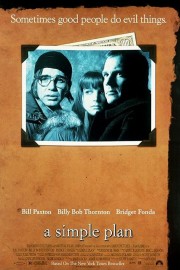A Simple Plan
Sam Raimi’s “A Simple Plan” has much in common with the Coen Brothers’s “Fargo.” Both are set in Minnesota, and both involve ordinary people who become entangled with schemes to get away with desparately-needed money that become far more complicated than they imagined. Raimi has been a friend of Joel and Ethan’s for many years, but their careers have largely followed on divergent paths. Though they did not collaborate on it like they did “The Hudsucker Proxy” or “Crime Wave,” this is another point of intersection, and though “Fargo” is one of the greatest films of all-time, “A Simple Plan,” especially after seeing it again for the first time in many years, is pretty damn good, in its own right, although the macabre humor “Fargo” employs is much more muted here.
Raimi’s film is based on a novel by Scott B. Smith, and it starts off with a simple hunting trip between friends, Hank (Bill Paxton), Jacob (Billy Bob Thornton) and Lou (Brent Briscoe) that turns their lives upside down. While in the woods, they find a downed airplane, a corpse pilot, and a bag with $4.4 million dollars in it. They haven’t heard about it, but while Hank discusses immediately turning it in, Jacob and Lou’s minds turn towards keeping it for themselves. Hank eventually relents, and is tasked with keeping the money with his pregnant wife, Sarah (Bridget Fonda). Almost immediately, however, little pieces of the plan begin to unravel, and gradually it snowballs into a tense standoff involving murder, blackmail, and coverups that feel all but certain to unglue the trio.
Whereas “Fargo” looks at the absurdity of crime through the most absurd of circumstances, “A Simple Plan” is more of a traditional film noir thriller, with a more serious play on the material. That doesn’t mean Raimi shies away from the gallows humor that has been an important part of his horror films, in particular, but it comes from a more subdued, naturalistic place than we experience it in an “Evil Dead” or “Army of Darkness.” This is more about character and unfolding a story over style, and Raimi shows a maturity that we hadn’t seen before in the director. This feels very different from most of his films, and he hasn’t quite followed it up with a similarly great effort, partially because he became involved in the Spider-Man franchise, but we see that he has the tools to delve into more mature subject matter if he wanted to. I hope we see him take some opportunities to do so.
One thing that really stood out to me in watching “A Simple Plan,” which features one of Danny Elfman’s best scores, again is how many of the characters are smarter than they first appear, or at least, show themselves to be smarter. Starting with Jacob, who has a goofy, worn-down look that, no doubt, contributed to Thornton’s much-deserved Oscar nomination, the character starts off a little slow, but reveals himself to be quietly cunning as this plan begins to go awry. It’s a sensational performance, and it’s easy to remember in watching it again why he stood out in a uniformly excellent cast. Paxton is the “everyman” in this film, and one thing that caught me is that, while he starts out as the “man with the plan,” in a way, he ends up probably being the most foolish of the bunch, not just because of how the film ends, but in how quickly he seems to go against his own plan. It’s a very straight-laced performance, but also a pretty great one for the character actor, whose dynamics with both Thornton and Fonda (whose Sarah is actually more the brains behind the “plan” than Hank is, once things get going) help elevate the film to where its finale works both dramatically, and as a cruel joke to Hank’s universe. Crime doesn’t pay, even when we have the best intentions. “A Simple Plan,” like “Fargo” before it, shows that in bold and brutally entertaining ways.










